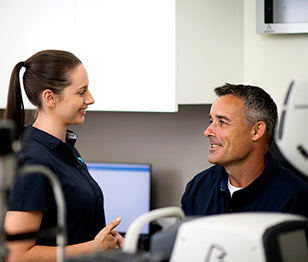Diabetes and your eyes

Here’s how diabetes can affect your eyes
About 7% of Australians have type 1 or 2 diabetes – and that number rises as we age. Nearly 20% of people over 75 have diabetes. Within 15 years or so of being diagnosed, most people will experience changes to their eyes.
It’s about your circulatory system
When you have diabetes, there’s a higher risk of having trouble with your eyes. If this is left untreated it can lead to poor vision and blindness. Diabetes is a disease of the circulatory system – and since the eyes are home to a complex network of blood vessels, high blood sugar can cause damage.
There’s good news though
98% of serious vision loss can be prevented with regular eye tests and early treatment – so it’s a great reason to keep up those regular eye checks as part of your diabetic management plan. Early detection is always better.
What is diabetic retinopathy?
When your blood sugar is high over a long period of time, it can increase the risk of serious eye conditions in people with diabetes, like cataracts, glaucoma and macular oedema. But diabetic retinopathy is the most common ocular condition caused by diabetes.
This affects the retina of the eye (the light sensitive portion at the back of the eye) and is caused by damage to the small blood vessels that nourish the retina. Diabetic retinopathy is a progressive disease – the better the blood sugar control of the diabetic, the less likely the disease is to progress.
It’s worth noting though that anyone who has diabetes (type 1 or type 2) can develop diabetic retinopathy, even if your blood sugar is well-controlled.
What does vision with diabetic retinopathy look like?
Click and drag the image below to see how diabetic retinopathy can affect your vision
Healthy vision
Regular checks are important
Diabetes-related eye complications often have no signs or symptoms right away, and there may be no obvious vision troubles until the condition is quite advanced. It’s highly recommended that you have regular eye exams every 1 to 2 years. Your optometrist will likely dilate your pupils to ensure they have the best view of your retina.
A healthy lifestyle and the right medication combined with medical check-ups can help keep your blood sugar under control – meaning you’re looking out for your eye health too.

We're here to help
Ask your optometrist if you have any questions about diabetes-related eye conditions or book an appointment today.
You might also like to read...
View all-
Understanding astigmatism
There’s a good chance you’ve heard of astigmatism before. It’s a common eye condition that causes blurred vision, discomfort in your eyes and headaches.
Eye conditionsUnderstanding astigmatism
There’s a good chance you’ve heard of astigmatism before. It’s a common eye condition that causes blurred vision, discomfort in your eyes and headaches.
Read more -
Learning more about cataracts
You’ve probably heard of cataracts – when the normally clear lens of the eye becomes cloudy. It happens because the lens becomes hardened, and it means a gradual decrease in...
Eye conditionsLearning more about cataracts
You’ve probably heard of cataracts – when the normally clear lens of the eye becomes cloudy. It happens because the lens becomes hardened, and it means a gradual decrease in...
Read more -
The ins and outs of colour deficiency
You might know colour deficiency by its other name – colour blindness. This name isn’t technically correct, as most people living with colour deficiency can actually still see colours.
Eye conditionsThe ins and outs of colour deficiency
You might know colour deficiency by its other name – colour blindness. This name isn’t technically correct, as most people living with colour deficiency can actually still see colours.
Read more






